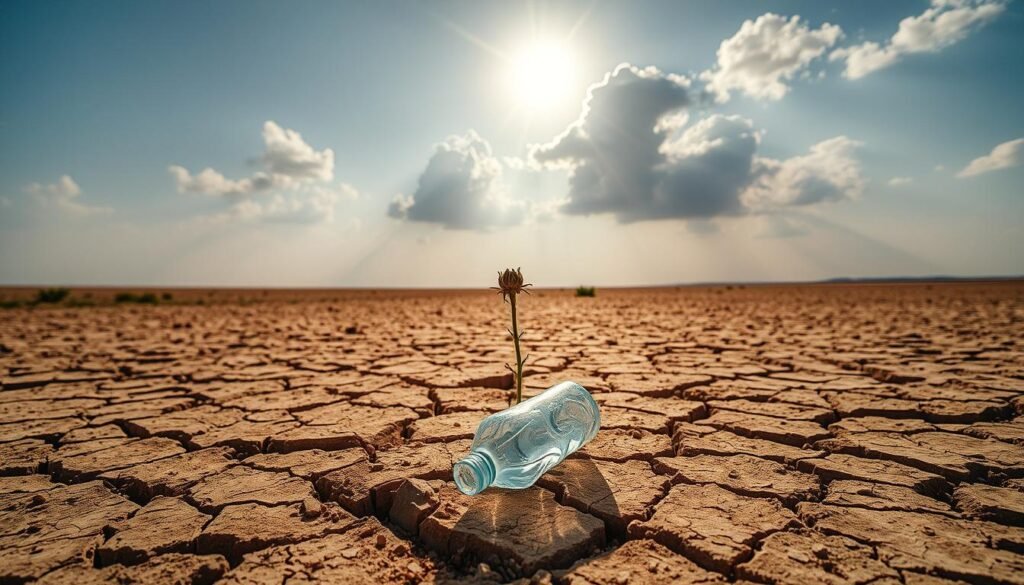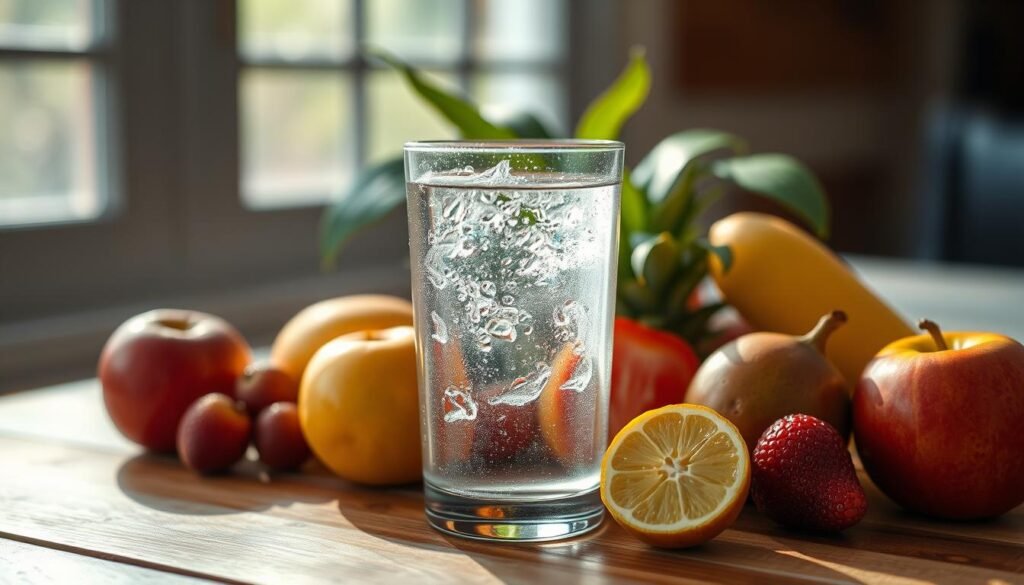Did you know the human brain is about 80% water? This fact highlights the importance of staying hydrated for our mental health. Since our body’s water content drops from 75% at birth to 60% in adulthood, keeping hydrated is key. Even a small drop in water levels can hurt how we think and feel.
The link between not drinking enough water and feeling down is important for our health. Being dehydrated can make us feel anxious, annoyed, and upset. It affects our mental state. Even losing 1-2% of our body’s water can make it hard to think clearly and focus. Knowing how water affects our mood and brain function is a simple way to improve our health.
About 17% to 28% of older people in the U.S. don’t drink enough water. This shows how common dehydration is. To understand how our physical surroundings impact how we feel, exploring the effects of a cluttered is useful. In short, drinking enough water is key to fight depression and live a happier life.
Key Takeaways
- Proper hydration is essential for optimal brain function.
- Mild dehydration can lead to increased feelings of anxiety and depression.
- Monitoring hydration levels is key to maintaining mental health.
- Understanding the link between water intake and mood can help improve overall well-being.
- Adjusting water intake based on individual needs is crucial.
- Dehydration can impact cognitive functions such as memory and concentration.
- Hydration plays a significant role in reducing stress levels.
Understanding Dehydration
Dehydration happens when you lose more fluids than you drink. This loss can seriously affect your body’s functions. It’s vital to know about this to stay healthy. The brain is about 75% water, showing how important water is for your health. Losing even a little bit of water, like 1.5%, can change your energy, clarity, and mood.
Dehydration affects your mental health too. It messes with how your brain makes energy and serotonin. Serotonin is a chemical that helps you feel happy. When dehydrated, your brain might not work as well, making you feel stressed. People who don’t drink enough water can also feel anxious, especially in stressful situations.
Being dehydrated can lead to hunger, headaches, tiredness, and dry mouth. These signs can be minor or severe. Women should drink about 11.5 cups of water a day, and men should drink about 15.5 cups. To know if you’re drinking enough, look at your urine’s color. Clear or pale yellow is good, but dark yellow means you’re not drinking enough.
To learn more about dehydration and mental health, visit this detailed resource. Knowing about hydration can help your brain, mood, and overall health a lot.
What is Depression?
Depression is more than just feeling sad. It changes how you feel, think, and handle daily life. People with depression might be really sad for a long time, and lose interest in things they used to like. It’s a serious condition that can be caused by many things, including your mind, your environment, and your body.
Drinking enough water could be linked to feeling better mentally. A study found that folks drinking less than two glasses of water a day were more likely to be depressed than those who drank five or more. Simply put, the more water people drank, the less likely they were to feel depressed.
Staying hydrated is about more than just physical health. Not having enough water can make you feel moody and less focused. Even not drinking water for a short time can zap your energy and make you feel less confident. It can also hurt your ability to remember and pay attention. But, drinking water can quickly make you feel better in these areas.
The link between drinking water and mental health is important. Keeping yourself well-hydrated helps keep your mood steady and can help with depression. Knowing all this might help us get better at treating mood problems.
Dehydration Symptoms
Knowing the signs of dehydration means you can act fast to help your body. Signs like feeling more thirsty, a dry mouth, and feeling tired are your body’s first warnings. If you start to feel dizzy or get a headache, pay attention. These are signs you need to hydrate for better health.
Common Signs of Dehydration
Look out for these dehydration signs:
- Thirst and dry mouth
- Fatigue and weakness
- Dizziness or light-headedness
- Headaches
- Dry skin and mucous membranes
- Poor concentration
Even losing 1-2% of your body’s water can signal dehydration. As it gets worse, your body reacts more strongly.
How to Recognize Severe Dehydration
It’s very important to recognize severe dehydration urgently. Here are the red flags:
- Confusion and irritability
- Rapid heartbeat
- Sunken eyes
- Fainting or extreme weakness
- Low blood pressure
If you see these dehydration symptoms, getting medical help is key. Severe dehydration means a loss of 6% or more of body water. Acting quickly is crucial to avoid serious health issues and aid recovery.
| Dehydration Level | Water Loss (%) | Symptoms |
|---|---|---|
| Mild Dehydration | 1-2% | Thirst, dry mouth, fatigue |
| Moderate Dehydration | 3-5% | Dizziness, headaches, low blood pressure |
| Severe Dehydration | 6% or more | Confusion, rapid heartbeat, fainting |
Dehydration Causes
Knowing the dehydration causes is crucial for our health. Many things can make us lose more fluid. Hot weather often causes us to sweat more, raising dehydration risks. Hard physical activity adds to this problem.
Sicknesses with vomiting or diarrhea also make us lose a lot of water. Pregnant or breastfeeding women and older adults need to watch their hydration closely. About 17% to 28% of older people in the U.S. are dehydrated often because they don’t feel thirsty.
Children are also at risk; about 55% of kids 6-19 don’t drink enough water. Losing just 3%-5% of their body weight can mildly dehydrate them. If they lose more than 10%, it becomes serious, and they need urgent care.

Not just age, but places can affect our hydration too. Being very high up, like 8,000 feet or more, makes us lose water faster. The air is drier, and we breathe faster. Knowing these risk factors helps us keep hydrated and avoid dehydration problems.
The Link Between Dehydration and Depression
It’s important to know how dehydration and depression are connected. Proper hydration is key for both our bodies and minds. Not drinking enough water can affect brain function and worsen depression symptoms.
Looking at how these two issues are related helps us understand how to feel better. Keeping your brain hydrated is a step towards improving mood and mental health.
How Dehydration Affects Brain Function
Dehydration slows down energy production in the brain. This makes the brain work less effectively. It can make you feel confused and tired.
Even being a little dehydrated can make you more depressed, studies show. Losing just 1% of your body water can affect your mood. Not enough water can disrupt your day and lower life quality.
The Impact of Water on Serotonin Production
Drinking water helps regulate mood. It keeps serotonin levels, an important brain chemical, balanced. Hydration ensures our body has the amino acids needed for serotonin.
Without enough water, serotonin production drops. This can lead to feeling anxious or irritable. Drinking enough water helps fight off these feelings and boosts mental health.
Mental Health and Hydration
Staying hydrated is key for good mental health. Studies show that not drinking enough water can harm your mind. It can affect your mood, focus, and mental sharpness. A lot of Americans understand that drinking water is vital for their mental health. In fact, 79% believe better hydration could enhance their life in many ways.
Being well-hydrated brings many perks. For example, 56% of Americans say it makes them feel happier. Also, 36% noticed they got more done when they drank enough water. About 32% felt more ready for their daily tasks, and 28% felt they managed their day better.
Drinking enough water also boosts confidence. Around 27% felt more confident with proper hydration. Hydrated people are more likely to help coworkers and take feedback well. This creates a positive work environment.
The brain is about 73% water and needs enough of it to function well. Not drinking enough water is linked to higher chances of depression and anxiety. A 2014 study found people felt less calm and more unhappy when not hydrated enough. Good hydration habits help with daily life and improve your mental health over time.
Effects of Dehydration on Mood
Dehydration impacts our mental well-being, causing mood swings and a dip in cognitive abilities. It’s crucial to keep ourselves hydrated to stay energetic and emotionally stable. Not drinking enough water leads to fatigue and dehydration, making us irritable and unable to focus. When we’re dehydrated, our mood worsens.
Fatigue and Dehydration
A study from the University of Connecticut’s Human Performance Laboratory shows mild dehydration can make us feel tired. People who were slightly dehydrated found it hard to do tasks and concentrate. Fatigue and dehydration feed off each other, making us feel even more drained and less motivated. Here are some signs to watch out for:
- Darker urine
- Dry mouth
- Tiredness
- Headaches
You should know these signs and drink more water to beat fatigue and feel better.
Headaches and Dehydration
Headaches often signal we’re not drinking enough water. Not having enough water increases stress and anxiety, which can make our heads hurt more. Our brains are about 75% water; low hydration means our ability to think and remember can suffer, causing headaches. Keeping well-hydrated helps lessen headache symptoms and boosts our mood.
So, drinking enough water is key to fighting off fatigue and headaches, and it helps our minds too. Make sure to drink plenty of water every day to keep dehydration away and maintain good mood levels.
How Much Water Should You Drink Daily?
Our bodies are made up of about 60% water. That’s why it’s key to drink enough each day. Men should try for 13 cups or roughly 3 liters of fluids daily. Women should aim for 9 cups, a little over 2 liters.
Pregnant women need about 10 cups, while those breastfeeding might need up to 12 cups. Kids and teenagers should get 6 to 8 cups to fuel their growth and stay active.

Water is the best choice for staying hydrated. But, foods like cucumbers and watermelons can also help. They are packed with water.
Coffee and tea are okay in moderation. Even though they might make you pee more, they still help with hydration.
Not drinking enough can make you feel off. It can mess with your mood and brain power. One way to keep track is by checking the color of your pee. If it’s clear or light yellow, you’re doing good. Carrying a water bottle can help you drink more. And, adding things like lemon to your water can make it tastier.
Many things change how much water you need. The weather, how much you move, and your health all play a part. People in hot places or those who exercise a lot may need more water. It’s important to know your body’s needs to stay healthy.
Tips for Maintaining Proper Hydration
Staying hydrated is key for good health. Many people struggle to drink enough every day. To boost hydration, you can follow some easy tips.
Start by drinking water with every meal. It’s a simple way to help digestion and hydration. Carry a reusable water bottle to encourage you to drink more. Seeing your bottle will remind you to take regular sips.
Eating foods like cantaloupe, strawberries, and lettuce helps too. They’re about 90% water and add to your hydration. Try adding lemon or mint to your water. It makes drinking water more fun.
- Use apps like Water Reminder or Waterllama to keep track of how much you drink.
- Try the HidrateSpark TAP bottle. It reminds you to drink based on your activity.
- Drink water two hours before bedtime to up your daily intake from 44 ounces to 68 ounces, studies suggest.
However, cold water might not be the best choice. Room-temperature water hydrates better. Since caffeine and alcohol can dehydrate you, drink more water to balance it out.
These hydration tips can help you stay well hydrated. This keeps you mentally and physically strong. For more info on staying hydrated, check out this resource.
Seeking Help for Depression and Anxiety
Knowing when to seek help for depression and anxiety is key. Many people find relief through professional help. This can be in the form of therapy or medicine. Getting mental health support is vital for improving well-being and tackling underlying issues.
Studies show that not drinking enough water can affect your mood and brain function. Mild dehydration can make it hard to think clearly, as found in research by the American Journal of Clinical Nutrition. So, drinking enough water is as important as getting help for mood problems. If you feel irritable or have trouble thinking, check your water intake and mental health.
To feel your best, you need to focus on both staying hydrated and mental health care. There are many ways to get help if you’re feeling really down, including medicine and therapy. Treatments like antidepressants or cognitive-behavioral therapy can be very helpful. SSRIs are often used, and therapy can teach you to think differently.
If you’re dealing with depression, talking to a mental health expert is a good step. They can come up with a treatment plan just for you. For more on how to spot and deal with depression, see this guide on detecting depression.

Conclusion
The link between staying hydrated and feeling mentally sharp is big. We need to drink enough water every day. About 73% of our brains is water. This shows how important water is for our thoughts and feelings. Drinking enough water is not a cure-all for depression. But, it’s key for managing it and helping us feel better.
Even being a little dehydrated can make us feel more anxious and mess with our brain power. So, knowing how water helps us feel good is really important. Drinking water that has important minerals like calcium and magnesium is a good idea. It can make us feel healthier and happier.
Our bodies need things called electrolytes to keep the water balance right. Paying attention to how much water we drink can lower anxiety and depression signs. Experts say drinking about 8-10 cups of water a day is a good goal. In the end, making sure we drink enough water is part of taking care of our mental health.